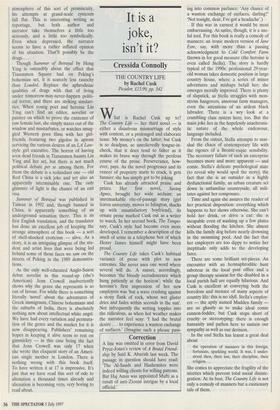Some first novels
Tom Hiney
One book certainly stands out among this summer's debut novels. The God of Small Things is a magically written effort by Arundhati Roy and deserves all the hype that it has already got. Shamelessly suburban and autobiographical in plot (a young middle-class Indian girl grows up in late Sixties Kerala) and at times very remi- niscent' of Salman Rushdie's Midnight's Children (both stories revolve loosely around family-run pickle factories), it is nonetheless quite brilliant: savvy, beautiful, and with the sort of overall rhythm that artists of all media should dream of managing, the only weak feature of the book being its rather drab dust-jacket. One can only strongly recommend this extremely funny and enchanting and pretty much genius piece of debut fiction.
Loaded, by Christos Tsiolkas, recalls a two-day bender round Melbourne by the book's 19-year-old, drug-guzzling, Greek immigrant gay narrator. What is staggering about young Ari's energetic weekend is not that anything of special note happens (this is not a thriller or even a rites-of-passage story) but quite the opposite; that the events retold clearly do not constitute an unusual weekend for him — possibly even quite a boring one, by the hero's high standards. It nonetheless takes us through about six random sex encounters that take place in or around two parties, three bars, a night club and a public lavatory. All this experienced while on enough drugs to dazzle Australia's entire national rugby team — a prospect one imagines Ari would relish. While the author certainly manages convincingly to recreate the mind and atmosphere of this sort of promiscuity, his attempts at grand-scale cynicism fall flat. This is interesting writing as reportage, but both author and narrator take themselves a little too seriously, and a little too symbolically. Even when depressed, the narrator seems to have a rather inflated opinion of his situation. That'll possibly be the drugs .. .
Though Summer of Betrayal by Hong Ying is ostensibly about the effect that Tiananmen Square had on Peking's bohemian set, it is scarcely less raunchy than Loaded. Replace the aphrodisiac qualities of drugs with that of living under tomorrow-may-never-happen politi- cal terror, and there are striking similari- ties. When young poet and heroine Lin Ying can't find an editor, novelist or painter on which to prove the existence of raw female lust, she simply stares out of the window and masturbates, or watches smug- gled Western porn films with her girl- friends, featuring two gigolos in aprons servicing the various desires of an LA Law- style girl executive. The horror of having seen dead friends in Tiananmen haunts Lin Ying and her set, but there is not much political debate per se among them. For them the debate is a redundant one — old Red China is a sick joke and yet also an apparently interminable one. The only glimmer of light is the chance of an exit visa.
Summer of Betrayal was published in Taiwan in 1992 and, though banned in China, is apparently something of an underground sensation there. This is its first English translation, and the translator has done an excellent job of keeping the strange atmosphere of this book — a sort of shell-shocked eroticism — alive. As a story, it is an intriguing glimpse of the stu- dent and artist lives that were being led behind some of those faces we saw on the streets of Peking in the 1989 demonstra- tions.
As the only well-educated Anglo-Saxon debut novelist in this round-up (she's American) Jenn Crowell inadvertently shows why the genre she represents is so out of favour. For while there is something literally 'novel' about the adventures of Greek immigrants, Chinese bohemians and the suburbs of India, there is absolutely nothing new about intellectual white angst. We have had every variation and permuta- tion of the genre and the market for it is now disappearing. Publishers' remaining hopes in keeping it alive seem to rest on gimmickry — in this case being the fact that Jenn Crowell was only 17 when she wrote this eloquent story of an Ameri- can single mother in London. There is nothing wrong with this book itself. To have written it at 17 is impressive. It's just that we have read this sort of ode to alienation a thousand times already and alienation is becoming very, very boring to read about.



























































 Previous page
Previous page